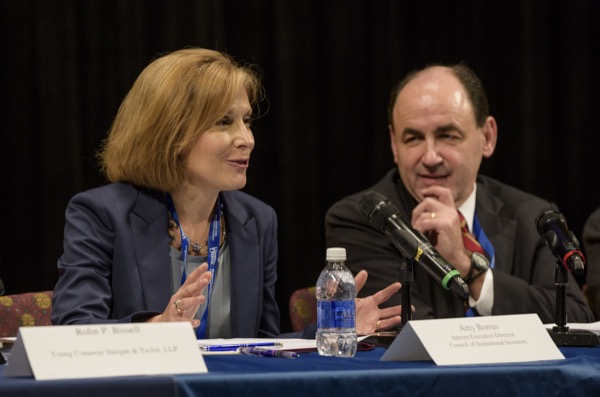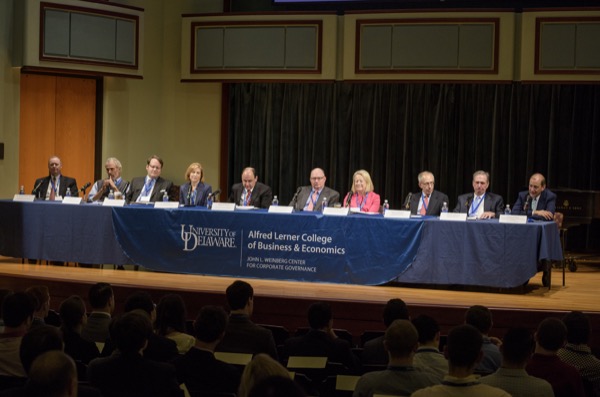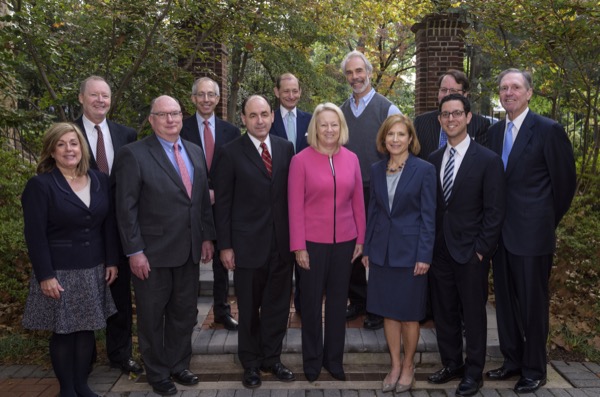'Government as Regulator'
Government's roles in business discussed by Weinberg Center panel
3:39 p.m., Nov. 5, 2015--Last month, regulators discovered that Volkswagen automakers intentionally programmed engines to provide inaccurate data and evade emissions standards.
In the aftermath of this scandal, a number of critical discussions are arising. Among them is the role of the government as a shareholder in the company.
Campus Stories
From graduates, faculty
Doctoral hooding
This role of government was also the topic of a panel discussion hosted by the University of Delaware’s John L. Weinberg Center for Corporate Governance in partnership with The Clearing House Association: “The Government as Regulator and/or Shareholder – The Impact on Director Duties: The Effect of Regulatory Mandates on Financial Institutions and Other Regulated Corporations in the Post Dodd-Frank Era.”
“Contemporary events often will intercede academic discussions,” said Charles Elson at the discussion. Elson serves as UD’s Edgar S. Woolard, Jr. Chair in Corporate Governance, a professor of finance and director of the Weinberg Center, and moderated the panel.
Elson explained that the German state of Lower Saxony is Volkswagen’s second-largest shareholder, owning about 20 percent of the company, and that this leads to a number of important questions.
“What impact did that government’s presence on the Volkswagen board and as a shareholder have on the company itself, and on the actions of the directors of the company?” Elson asked. “Was it a vehicle for full employment for the citizens of Lower Saxony, and therefore did the government push that agenda over a regulatory agenda, or not?”
“That’s an interesting open question, which really highlights what we’re talking about today,” Elson said.
Panel discussion
“The fact that we’ve assembled such a distinguished set of panelists speaks to the importance and timeliness of this conference,” said Gregg Rozansky, managing director at The Clearing House, during his opening remarks.
This panel included:
- Rolin P. Bissell, partner, Young Conaway Stargatt & Taylor LLP;
- Amy Borrus, interim executive director, Council of Institutional Investors;
- Laban P. Jackson, Jr., chairman and CEO, Clear Creek Properties Inc. and director, JPMorgan Chase & Co.;
- Peter A. Langerman, chief executive officer, Franklin Mutual Advisers LLC;
- Giovanni P. Prezioso, partner, Cleary Gottlieb Steen & Hamilton LLP;
- Edward B. Rock, Saul A. Fox Distinguished Professor of Business Law, University of Pennsylvania Law School;
- Mary Schapiro, advisory board vice chair, Promontory Financial Group LLC and former chairman, U.S. Securities and Exchange Commission;
- Collins J. Seitz, Jr., justice, Supreme Court of Delaware; and
- Michael M. Wiseman, partner, Sullivan & Cromwell LLP.
As moderator, Elson addressed a number of topical questions, like “What is the responsibility of the director of a company where the government is both a significant shareholder and a significant regulator?” and “How does the board of directors reconcile the interest of government as a shareholder with other shareholders?”
In their responses, panelists introduced the issues companies and regulators face as they operate amongst shifting rules and standards resulting from the financial crisis of 2008.
“Other than that time, we have not really addressed the issue of the government as significant owner and regulator,” said one panelist.
“These situations present a real conundrum for shareholders,” the panelist continued. “When the government takes a significant ownership stake in the company, its ultimate goals may be different, much broader.”
Another panelist agreed, saying, “When you decide that companies are not going to be allowed to fail, then you’ve got to have some other mechanism to govern them. And we don’t really have one.”
“I’m skeptical about concerns I’ve heard that all this extra regulation will make it harder for banks to attract qualified directors,” added one panelist. “That ‘we can’t find enough qualified candidates’ lament is too often the excuse of companies whose boards lack diversity. The answer usually is to cast a wider net.”
Another panelist said that it’s crucial to remember the common ground between regulators and corporations.
“There are lots of areas of common concern between regulators and companies and their boards,” the panelist said. “They both really want to preserve the safety and soundness of the institution and enhance shareholder value in sustainable ways.”
One panelist added that business owners should remember that regulators “are people just like us.”
“They get up every morning and they’re trying to do the best job they can do,” the panelist said. “They’ve been incredibly politicized… They’re just trying to do their jobs.”
Regulators, the panelist continued, are “calming down” since the 2008 financial crisis, “because they’re seeing us do real work on their issues, which we should do.”
In relation to the 2008 crisis, one panelist offered advice to students in the audience who may have been very young at the time.
“Read some of the books from 2008, because it was the first genuine financial panic in a generation or two,” the panelist said. “The dynamics of panic are critically important to understanding the range of reasonable and possible responses. 2008 was a panic, and a whole generation of financial regulation has been born out of that panic and out of that financial crisis.”
Response from the audience
Audience member Frank DePinto, a UD finance and economics student, said that the panel discussion helped him to understand how governments can wield significant power within companies.
“It definitely shed some light on the government’s role and how they can impact the decisions and interests and motives of the board of a company,” DePinto said. “These implications are relevant for any corporation.”
Fellow finance student Andrew Nemroff agreed, saying, “It was a really cool opportunity to see such a diverse panel speak about such a current issue.”
But not all students in the audience were part of the Alfred Lerner College of Business and Economics.
UD freshman Emiko Tam Haga, a Russian language major interested in international relations, attended the discussion to learn more about the subject.
“Being on a college campus, it’s important to expand your breadth of knowledge, be involved in economics and understand fiscal responsibility,” Tam Haga said.
“Understanding that there is a certain dynamic to government as shareholder and as regulator is a concept that I wasn’t familiar with,” she continued. “Hearing the panelists talk about it was very interesting.”
Also in the audience was UD staff member Alex Lindstrom, whose work in IT and security balances legal and auditing requirements with operational interests.
Lindstrom said that the panel discussion “was of great interest because it deals with how administrative leaders hand down different mandates according to regulation, and what role regulation plays in the structuring and the management or the organization.”
Article by Sunny Rosen
Photos by Kathy F. Atkinson














